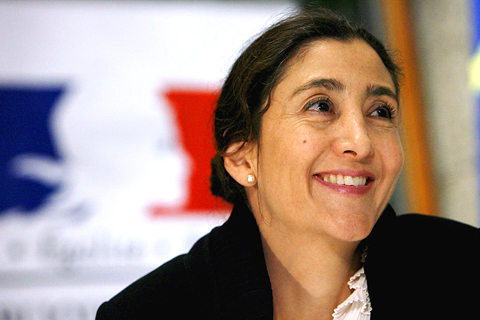Former Colombian presidential candidate Ingrid Betancourt pledged on Saturday to press Latin American leaders to help get the Revolutionary Armed Forces of Colombia (FARC) rebels to disarm, after arriving in Colombia for the first time since she was rescued from guerrillas after a six-year hostage ordeal.
“I am so very happy to be here,” she said shortly after arriving at Bogota’s El Dorado international airport where she and her mother, Yolanda Pulecio, were greeted by French Ambassador Jean-Michel Marlaud.
Betancourt, 46, who holds dual Colombian and French citizenship, flew to France with her family three weeks after her release on July 2. On Saturday she was whisked to a private meeting with Colombian President Alvaro Uribe at the CATAM military airport adjacent to El Dorado.

PHOTO: EPA
She said she would visit Quito, Lima, Santiago, Buenos Aires, Sao Paulo, Brazil, La Paz and Caracas.
Her goal is to ask presidents to join a drive to get the FARC to lay down its arms, a statement obtained by AFP said.
Betancourt’s visit to Colombia five months after her rescue will be brief since she has often stated she fears for her life here after receiving death threats from rebels.
The online edition of Brazil’s O Globo daily said Betancourt would meet with Brazilian President Luis Inacio Lula da Silva in Sao Paulo on Friday.
Betancourt’s visit to Colombia comes 24 hours after tens of thousands marched in France, Spain and across Colombia demanding the release of hostages still being held by the FARC, Latin America’s largest and longest-fighting rebel group.
Betancourt headed a demonstration in Madrid alongside Spanish Foreign Minister Miguel Angel Moratinos.
But her homecoming is fuel for mixed feelings in Colombia.
While tens of thousands marched in some 200 Colombian cities on Friday to demand the release of thousands of hostages held by the FARC and other rebel and criminal groups in the country, the demonstrations were far less massively supported than on July 20, when some 4 million Colombians turned out to voice outrage at the ongoing hostage situation.
The lower turnout on Friday was in part blamed on the ill feelings that many Colombians have toward Betancourt for leaving their country so soon after her rescue.
“We feel deeply for her six years of captivity, but she’s using the [hostage] issue as a political platform,” Oscar Morales, the founder of the One Million Voices Against FARC movement, told Bogota’s El Tiempo newspaper.
Betancourt has said that she does not wish to return to politics in Colombia.

STEPPING UP: Diminished US polar science presence mean opportunities for the UK and other countries, although China or Russia might also fill that gap, a researcher said The UK’s flagship polar research vessel is to head to Antarctica next week to help advance dozens of climate change-linked science projects, as Western nations spearhead studies there while the US withdraws. The RRS Sir David Attenborough, a state-of-the-art ship named after the renowned British naturalist, would aid research on everything from “hunting underwater tsunamis” to tracking glacier melt and whale populations. Operated by the British Antarctic Survey (BAS), the country’s polar research institute, the 15,000-tonne icebreaker — boasting a helipad, and various laboratories and gadgetry — is pivotal to the UK’s efforts to assess climate change’s impact there. “The saying goes

Floods on Sunday trapped people in vehicles and homes in Spain as torrential rain drenched the northeastern Catalonia region, a day after downpours unleashed travel chaos on the Mediterranean island of Ibiza. Local media shared videos of roaring torrents of brown water tearing through streets and submerging vehicles. National weather agency AEMET decreed the highest red alert in the province of Tarragona, warning of 180mm of rain in 12 hours in the Ebro River delta. Catalan fire service spokesman Oriol Corbella told reporters people had been caught by surprise, with people trapped “inside vehicles, in buildings, on ground floors.” Santa Barbara Mayor Josep Lluis

Police in China detained dozens of pastors of one of its largest underground churches over the weekend, a church spokesperson and relatives said, in the biggest crackdown on Christians since 2018. The detentions, which come amid renewed China-US tensions after Beijing dramatically expanded rare earth export controls last week, drew condemnation from US Secretary of State Marco Rubio, who on Sunday called for the immediate release of the pastors. Pastor Jin Mingri (金明日), founder of Zion Church, an unofficial “house church” not sanctioned by the Chinese government, was detained at his home in the southern city of Beihai on Friday evening, said

TICKING CLOCK: A path to a budget agreement was still possible, the president’s office said, as a debate on reversing an increase of the pension age carries on French President Emmanuel Macron yesterday was racing to find a new prime minister within a two-day deadline after the resignation of outgoing French Prime Minister Sebastien Lecornu tipped the country deeper into political crisis. The presidency late on Wednesday said that Macron would name a new prime minister within 48 hours, indicating that the appointment would come by this evening at the latest. Lecornu told French television in an interview that he expected a new prime minister to be named — rather than early legislative elections or Macron’s resignation — to resolve the crisis. The developments were the latest twists in three tumultuous